|
|
|
Sort Order |
|
|
|
Items / Page
|
|
|
|
|
|
|
| Srl | Item |
| 1 |
ID:
132531


|
|
|
|
|
| Publication |
2014.
|
| Summary/Abstract |
Afghanistan has been the global epicenter of heroin production for the past decade. Heroin networks and drug lords present a principal impediment to security, state building, and democratic governance. Beyond the national boundaries, Afghan-originated heroin creates enormous challenges for international security by financing terrorism, instigating corruption, killing nearly 100,000 users worldwide every year, undermining public order, and debilitating economic development. The devastating impacts of the Afghan heroin trade have spilled over into Southwest Asia, Central Asia, Russia, China, the Balkans, and Europe. Because Turkey stands on the shortest transit pathway between Southwest Asia and Europe, it is intensively exposed to illicit flows of Afghan heroin along the Balkan Route. Transnational crime syndicates have been exploiting Turkish territories for decades for the purpose of trafficking heroin to European markets. This paper discusses Afghan heroin as an international security conundrum. It further seeks to explore the dimensions of the threat in Turkey, new patterns in heroin trafficking, and profiles and operation modes of transnational syndicates. The analyses are based upon the scrutiny of important case files, national seizure database, and annual KOM provincial questionnaires. In conclusion, the paper puts forward policy recommendations for security elites both in Turkey and in other states affected by the illicit trade of Afghan heroin.
|
|
|
|
|
|
|
|
|
|
|
|
|
|
|
|
| 2 |
ID:
130237
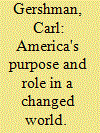

|
|
|
|
|
| Publication |
2014.
|
| Summary/Abstract |
Public opinion reports on Americans' attitudes toward foreign policy sketch a picture of retrenchment, war-weariness, and skepticism toward global engagement, even as there is also a growing concern that the world is increasingly unstable and dangerous. Nothing about this picture is new or controversial. Some may worry about it more than others, but it is now commonly accepted that the US is downsizing its international role, and that the administration, the Congress, and the general public are more absorbed with domestic concerns than with foreign challenges or threats.
|
|
|
|
|
|
|
|
|
|
|
|
|
|
|
|
| 3 |
ID:
130238
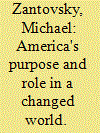

|
|
|
|
|
| Publication |
2014.
|
| Summary/Abstract |
It is not a new observation that, just as the twentieth century started late, with the shots in Sarajevo, so did the twenty-first century, with the September 11th attacks. Compared to the conflagration that followed the first event, whose centennial this year is a welcome opportunity for some belated soul-searching, the bloodshed that started with the second event has been limited, but its consequences may have been just as profound. The two American administrations that inherited the post-September 11th world have since struggled, along with the rest of the world, with the consequences. One chose to confront the evil head-on, in order to eradicate its sources and deter its repetition, with mixed results. The other largely opted for seeing and hearing little evil, with results that the jury is still out considering.
|
|
|
|
|
|
|
|
|
|
|
|
|
|
|
|
| 4 |
ID:
132932
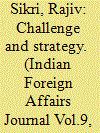

|
|
|
|
|
| Publication |
2014.
|
| Summary/Abstract |
For some time now, there has been a buzz about India's growing role in the world and a widespread feeling that India must play a much larger global role. Today, this feeling has become far more acute.
It is important, then, that there should be greater, and more widespread, awareness of foreign policy challenges faced by India, as well as a deeper understanding of the stakes and options for India's foreign policy. The public needs to be more knowledgeable about foreign affairs, which cannot be the concern only of those who exercise power in New Delhi. It is something in which every citizen should be involved. It is also essential that there should be a vibrant and constructive debate, especially involving the young, on where we are headed and why, because unless there is public support our foreign policy will not be successful. Some recent incidents pertaining to our relations with Sri Lanka and Bangladesh where the Chief Ministers of Tamil Nadu and West Bengal respectively forced the hand of the Central Government illustrate this point. I am glad that the BJP manifesto talks about having a "Team India" that brings together the Prime Minister and the Chief Ministers of States.
My conversation with you today is a small effort to create this awareness, perhaps stimulate your imagination and set you thinking.
|
|
|
|
|
|
|
|
|
|
|
|
|
|
|
|
| 5 |
ID:
132880
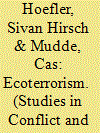

|
|
|
|
|
| Publication |
2014.
|
| Summary/Abstract |
This article examines the phenomenon of "ecoterrorism" from a conceptual and empirical perspective. We explore the political and academic debates over the meaning and use of the term ecoterrorism, and assess the validity of the concept of "ecoterrorism" and of the alleged threat of the Radical Environmentalist and Animal Rights (REAR) movement by analyzing the characteristics of both the movement and its actions. Our analysis shows that the term ecoterrorism should only be used for a small proportion of the actions of REAR movement. Consequently, counterterrorist measures should only target these terrorist minorities, rather than all groups and the broader movement.
|
|
|
|
|
|
|
|
|
|
|
|
|
|
|
|
| 6 |
ID:
168428
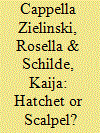

|
|
|
|
|
| Summary/Abstract |
Budgetary cuts are characterized by distinct political, organizational, and psychological dynamics in contrast to increases. Ideally, policymakers rank, prioritize, and assess among likely strategic challenges to identify the appropriate offices, programs, line items, or service branches in which to curtail spending. Targeted cuts—preserving some line items or services while cutting others—occurred during the Eisenhower, Kennedy, Ford, and Clinton administrations. In contrast, the Nixon, H.W. Bush, and Obama administrations implemented across-the-board cuts, impacting all areas of the budget uniformly, regardless of strategic priorities. We argue that the ability of the executive to target and redirect spending commensurate with national security needs are constrained by domestic interests. However, the degree to which the threat environment is diverse conditions the number of available policy options and, in turn, executive capacity to implement targeted cuts vis-à-vis parochial interests.
|
|
|
|
|
|
|
|
|
|
|
|
|
|
|
|
| 7 |
ID:
108136
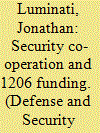

|
|
|
| 8 |
ID:
141121
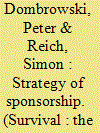

|
|
|
|
|
| Summary/Abstract |
Critics of US President Barack Obama’s grand strategy have alternatively argued that the president has one and it is wrongheaded, or that he has none and needs one. This latter claim extends beyond the predictable array of Republicans jostling to contest the 2016 presidential election to include varied analysts, academics and even members of the president’s own party, notably Hillary Rodham Clinton.
|
|
|
|
|
|
|
|
|
|
|
|
|
|
|
|
|
|
|
|
|